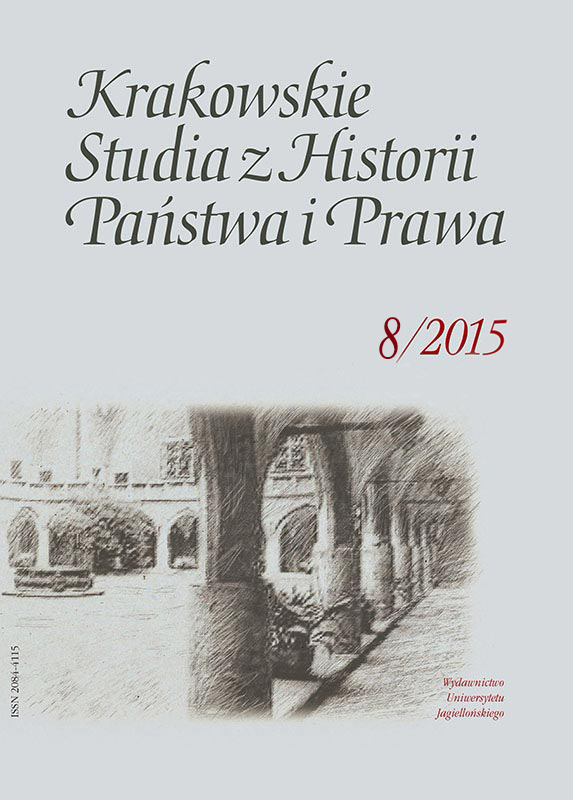Pierwsze podręczniki rosyjskiego prawa administracyjnego
The First Russian Books of administrative Law
Author(s): Grzegorz SmykSubject(s): Law, Constitution, Jurisprudence, History of Law
Published by: Wydawnictwo Uniwersytetu Jagiellońskiego
Keywords: administration; administrative science; administrative law
Summary/Abstract: The objective of the paper is to present comprehensively, but also in a specific way, the Warsaw society dealing with the science of law during partitions i.e. the Duchy of Warsaw and the Polish Kingdom (in the years 1807–1915). Within these years Warsaw was developing dynamically and became a modern, capitalistic city, and as a result of that the social and economic changes considerably influenced legal alterations both in the sphere of public and private law. The paper sets forth three main issues.First, it shows the scholarly activities of Warsaw lawyers associated with two higher schools: the Warsaw University in the years 1808–1831, and the Law and Administration Faculty of the Warsaw School in the years 1862–1869. Beyond this, the paper presents some of the scientific achievements of lawyers who were active independently of the higher schools which were closed down for political reasons, and when legal publications could be printed mainly in scientific newspapers.Secondly, the paper deals with the problem of the law defining court procedures differently from that of the Russian Empire, especially in civil law where the differences between the French and Polish systems remained until the end of the presented period. This difference considerably influenced the scientific works of the Warsaw society, distinguishing it from the legal societies in the territories of the other partitions.Thirdly, the scientific achievements of four subsequent generations of lawyers are analyzed in broader perspective. Profiles of scholars, their views, and associations with different schools of thought in the first generation of 1808–1831 are presented, followed by the second generation, which was active in the period between the November and January Uprisings. Among those lawyers there were supporters of both natural law and of the historical school, but with time there were more and more of those who subscribed to the dogmatic method and the French school of exegesis. The third and fourth generations, active in the 1860s, were associated first with the Law and Administration Faculty of the Warsaw School, and then with the newspaper – “Gazeta Sądowa Warszawska.” This age was characterized by legal positivism, but also by the still extant historical school. Generally speaking, the works of Warsaw lawyers were varied and miscellaneous, and on an equivalent level with European counterparts, but national in their character.A characteristic of the Russian legal-administrative literature, nearly until the end of the nineteenth century, was a predominance of the police manner of formulating functions and duties of public administration. It led to a lack of clear distinction between the sciences of administration and of administrative law and to the distinct attenuating of the latter science. It appears to have been the result of both the Russian tradition of exposing administrative-structural issues dating back to the close of the eighteenth century and the weakness of the domestic theory of administrative law, constantly colliding with the formal political-structural frameworks of the Empire. However, the works of such authors as Wasilczikow, Kuplewskij, Iwanowskij, Tarasow or Jelistratow, although they were very few, were original in their content, and were the exceptions, setting the direction for the development of Russian administrative sciences, and constituting a peculiar reference point in Russian legal-administrative literature. Although they were free of most of the defects that the works of their predecessors were affected with, they were also rather an attempt to adjust the new trends dominating in western European literature to the situation in the Russian Empire, which condemned them to the position of always being one step behind in relation to their French or German counterparts. A characteristic of the Russian legal-administrative literature, nearly until the end of the nineteenth century, was a predominance of the police manner of formulating functions and duties of public administration. It led to a lack of clear distinction between the sciences of administration and of administrative law and to the distinct attenuating of the latter science. It appears to have been the result of both the Russian tradition of exposing administrative-structural issues dating back to the close of the eighteenth century and the weakness of the domestic theory of administrative law, constantly colliding with the formal political-structural frameworks of the Empire. However, the works of such authors as Wasilczikow, Kuplewskij, Iwanowskij, Tarasow or Jelistratow, although they were very few, were original in their content, and were the exceptions, setting the direction for the development of Russian administrative sciences, and constituting a peculiar reference point in Russian legal-administrative literature. Although they were free of most of the defects that the works of their predecessors were affected with, they were also rather an attempt to adjust the new trends dominating in western European literature to the situation in the Russian Empire, which condemned them to the position of always being one step behind in relation to their French or German counterparts.
Journal: Krakowskie Studia z Historii Państwa i Prawa
- Issue Year: 8/2015
- Issue No: 1
- Page Range: 25-40
- Page Count: 25
- Language: Polish

